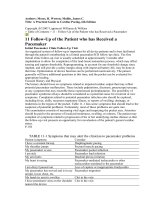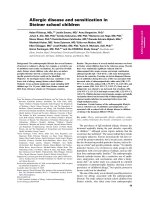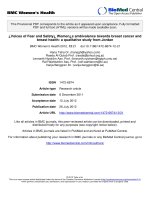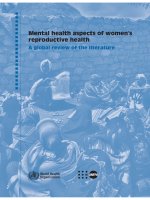Doctor and Patient, by S. Weir Mitchell pptx
Bạn đang xem bản rút gọn của tài liệu. Xem và tải ngay bản đầy đủ của tài liệu tại đây (637.38 KB, 345 trang )
The Project Gutenberg EBook of Doctor
and Patient, by S. Weir Mitchell
This eBook is for the use of anyone
anywhere at no cost and with almost no
restrictions whatsoever. You may copy
it, give it away or re-use it under the
terms of the Project Gutenberg License
included with this eBook or online at
www.gutenberg.net
Title: Doctor and Patient
Author: S. Weir Mitchell
Release Date: February 9, 2005 [EBook
#15004]
Language: English
*** START OF THIS PROJECT
GUTENBERG EBOOK DOCTOR AND
PATIENT ***
Produced by Audrey Longhurst, LN
Yaddanapudi, Leonard Johnson and the
PG Online Distributed Proofreading
Team at
DOCTOR AND
PATIENT.
BY
S. WEIR MITCHELL, M.D., LL.D. HARV.
MEMBER OF THE UNITED STATES
NATIONAL ACADEMY OF SCIENCES,
PRESIDENT OF THE COLLEGE OF
PHYSICIANS OF PHILADELPHIA,
PHYSICIAN TO THE ORTHOPÆDIC
HOSPITAL AND INFIRMARY FOR
NERVOUS DISEASES.
Introductory. The Physician.
Convalescence. Pain and its
Consequences. The Moral
Management of Sick or Invalid
Children. Nervousness and its
Influence on Character. Out-Door
and Camp-Life for Women.
THIRD EDITION.
PHILADELPHIA:
J.B. LIPPINCOTT COMPANY.
LONDON: 36 SOUTHAMPTON
STREET, COVENT GARDEN.
1901.
CONTENTS.
INTRODUCTORY
THE PHYSICIAN
CONVALESCENCE
PAIN AND ITS CONSEQUENCES
THE MORAL MANAGEMENT OF SICK
OR INVALID CHILDREN
NERVOUSNESS AND ITS INFLUENCE ON
CHARACTER
OUT-DOOR AND CAMP-LIFE FOR
WOMEN
INTRODUCTORY.
The essays which compose this volume
deal chiefly with a variety of subjects to
which every physician must have given
more or less thought. Some of them touch
on matters concerning the mutual relation
of physician and patient, but are meant to
interest and instruct the laity rather than
the medical attendant. The larger number
have from their nature a closer relation
to the needs of women than of men.
It has been my fate of late years to have
in my medical care very many women
who, from one or another cause, were
what is called nervous. Few of them
were so happily constituted as to need
from me neither counsel nor warnings.
Very often such were desired, more
commonly they were given unsought, as
but a part of that duty which the
physician feels, a duty which is but half
fulfilled when we think of the body as
our only province.
Many times I have been asked if there
were no book that helpfully dealt with
some of the questions which a weak or
nervous woman, or a woman who has
been these, would wish to have
answered. I knew of none, nor can I
flatter myself that the parts of this
present little volume, in which I have
sought to aid this class of patients, are
fully adequate to the purpose.
I was tempted when I wrote these essays
to call them lay sermons, so serious did
some of their subjects seem to me. They
touch, indeed, on matters involving
certain of the most difficult problems in
human life, and involve so much that
goes to mar or make character, that no
man could too gravely approach such a
task. Not all, however, of these chapters
are of this nature, and I have, therefore,
contented myself with a title which does
not so clearly suggest the preacher.
It would be scarcely correct to state that
their substance or advice was personally
addressed to those still actually nervous.
To them a word or two of sustaining
approval, a smiling remonstrance, or a
few phrases of definite explanation, are
all that the wise and patient doctor
should then wish to use. Constant
inquiries and a too great appearance of
what must be at times merely acted
interest, are harmful.
When I was a small boy, my father
watched me one day hoeing in my little
garden. In reply to a question, I said I
was digging up my potatoes to see if they
were growing. He laughed, and returned,
"When you are a man, you will find it
unwise to dig up your potatoes every day
to see if they are growing." Nor has the
moral of his remark been lost on me. It is
as useless to be constantly digging up a
person's symptoms to see if they are
better, and still greater folly to preach
long sermons of advice to such as are
under the despotism of ungoverned
emotion, or whirled on the wayward
currents of hysteria. To read the riot act
to a mob of emotions is valueless, and
he who is wise will choose a more
wholesome hour for his exhortations.
Before and after are the preacher's
hopeful occasions, not the moment when
excitement is at its highest, and the self-
control we seek to get help from at its
lowest ebb.
There are, as I have said, two periods
when such an effort is wise,—the days
of health, or of the small beginnings of
nervousness, and of the uncontrol which
is born of it, and the time when, after
months or years of sickness, you have
given back to the patient physical vigor,
and with it a growing capacity to
cultivate anew those lesser morals
which fatally wither before the
weariness of pain and bodily weakness.
When you sit beside a woman you have
saved from mournful years of
feebleness, and set afoot to taste anew
the joy of wholesome life, nothing seems
easier than with hope at your side, and a
chorus of gratitude in the woman's soul,
to show her how she has failed, and to
make clear to her how she is to regain
and preserve domination over her
emotions; nor is it then less easy to point
out how the moral failures, which were
the outcome of sickness, may be atoned
for in the future, now that she has been
taught to see their meaning, their evils
for herself, and their sad influence on the
lives of others.
To preach to a mass of unseen people is
quite another and a less easy matter. I
approach it with a strong sense that it
may have far less certain utility than the
advice and exhortation addressed to the
individual with such force as personal
presence, backed by a knowledge of
their peculiar needs, may give. I am
now, then, for the first time, in the
position of the higher class of teachers,
who lay before a multitude what will be
usefully assimilated by the few.
If my power to say what is best fitted to
help my readers were as large as the
experience that guides my speech, I
should feel more assured of its value.
But sometimes the very excess of the
material from which one is to deduce
formulas and to draw remembrances is
an embarrassment, for I think I may say
without lack of modesty in statement,
that perhaps scarce any one can have
seen more of women who have been
made by disease, disorder, outward
circumstance, temperament, or some
combination of these, morbid in mind, or
been tormented out of just relation to the
world about them.
The position of the physician who deals
with this class of ailments, with the
nervous and feeble, the painworn, the
hysterical, is one of the utmost gravity. It
demands the kindliest charity. It exacts
the most temperate judgments. It requires
active, good temper. Patience, firmness,
and discretion are among its necessities.
Above all, the man who is to deal with
such cases must carry with him that
earnestness which wins confidence.
None other can learn all that should be
learned by a physician of the lives,
habits, and symptoms of the different
people whose cases he has to treat.
From the rack of sickness sad
confessions come to him, more, indeed,
than he may care to hear. To confess is,
for mysterious reasons, most profoundly
human, and in weak and nervous women
this tendency is sometimes exaggerated
to the actual distortion of facts. The
priest hears the crime or folly of the
hour, but to the physician are oftener told
the long, sad tales of a whole life, its
far-away mistakes, its failures, and its
faults. None may be quite foreign to his
purpose or needs. The causes of
breakdowns and nervous disaster, and
consequent emotional disturbances and
their bitter fruit, are often to be sought in
the remote past. He may dislike the
quest, but he cannot avoid it. If he be a
student of character, it will have for him
a personal interest as well as the
relative value of its applicative side.
The moral world of the sick-bed
explains in a measure some of the things
that are strange in daily life, and the man
who does not know sick women does not
know women.
I have been often asked by ill women if
my contact with the nervous weaknesses,
the petty moral deformities of nervous
feminine natures, had not lessened my
esteem for woman. I say, surely, no! So
much of these is due to educational
errors, so much to false relationships
with husbands, so much is born out of
that which healthfully dealt with, or
fortunately surrounded, goes to make all
that is sincerely charming in the best of
women. The largest knowledge finds the
largest excuses, and therefore no group
of men so truly interprets, comprehends,
and sympathizes with woman as do
physicians, who know how near to
disorder and how close to misfortune
she is brought by the very peculiarities
of her nature, which evolve in health the
flower and fruitage of her perfect life.
With all her weakness, her unstable
emotionality, her tendency to morally
warp when long nervously ill, she is
then far easier to deal with, far more
amenable to reason, far more sure to be
comfortable as a patient, than the man
who is relatively in a like position. The
reasons for this are too obvious to delay
me here, and physicians accustomed to
deal with both sexes as sick people will
be apt to justify my position.
It would be easy, and in some sense
valuable, could a man of large
experience and intelligent sympathies
write a book for women, in which he
would treat plainly of the normal circle
of their physiological lives; but this
would be a method of dealing with the
whole matter which would be open to
criticism, and for me, at least, a task
difficult to the verge of the impossible. I
propose a more superficial plan as on
the whole the most useful. The man who
desires to write in a popular way of
nervous women and of her who is to be
taught how not to become that sorrowful
thing, a nervous woman, must
acknowledge, like the Anglo-Saxon
novelist, certain reputable limitations.
The best readers are, however, in a
measure co-operative authors, and may
be left to interpolate the unsaid. A true
book is the author, the book and the
reader. And this is so not only as to what
is left for the reader to fill in, but also
has larger applications. All this may be
commonplace enough, but naturally
comes back to one who is making
personal appeals without the aid of
personal presence.
Because what I shall write is meant for
popular use rather than for my own
profession, I have made my statements
as simple as possible. Scarcely a fact I
state, or a piece of advice I give, might
not be explained or justified by
physiological reasoning which would
carry me far beyond the depth of those
for whom I wrote. All this I have
sedulously avoided.
What I shall have to say in these pages
will trench but little on the mooted
ground of the differences between men
and women. I take women as they are to
my experience. For me the grave
significance of sexual difference
controls the whole question, and, if I say
little of it in words, I cannot exclude it
from my thought of them and their
difficulties. The woman's desire to be on
a level of competition with man and to
assume his duties is, I am sure, making
mischief, for it is my belief that no length
of generations of change in her education
and modes of activity will ever really
alter her characteristics. She is
physiologically other than the man. I am
concerned with her now as she is, only
desiring to help her in my small way to
be in wiser and more healthful fashion
what I believe her Maker meant her to
be, and to teach her how not to be that
with which her physiological
construction and the strong ordeals of
her sexual life threaten her as no
contingencies of man's career threaten in
like measure or like number the feeblest
of the masculine sex.
THE PHYSICIAN.
I have long had in mind to write from a
physician's point of view something in
regard to the way in which the well-
trained man of my profession does his
work. My inclination to justify the labors
and sentiments of an often misunderstood
body of men was lately reinforced by
remarks made to me by a very intelligent
patient. I found him, when I entered my
room, standing before an admirable copy
of the famous portrait of the great
William Harvey, the original of which is
in the Royal College of Physicians. After
asking of whom it was a likeness, he
said, "I should be a little curious to
know how he would have treated my
case."
I had to confess that of Harvey's modes
of practice we know little, but I took
down from a shelf those odd and most
interesting letters of Howell's, clerk of
council to James I., and turned to his
account of having consulted Harvey on
returning home from Spain. Only too
briefly he tells what was done for him,
but was naturally most concerned about
himself and thus missed a chance for us,
because it so happens that we know little
of Harvey. At this page of Howelliana
was a yellow paper-marker. Once the
book was Walpole's, and after him was
Thackeray's, and I like to fancy that
Walpole left the marker, and that
Thackeray saw it and left it, too, as I
did.
My patient, who liked books, was
interested, and went on to say that he had
seen several physicians in Europe and
America. That in France they always
advised spas and water-cure, and that at
least three physicians in America and
one in London had told him there was









